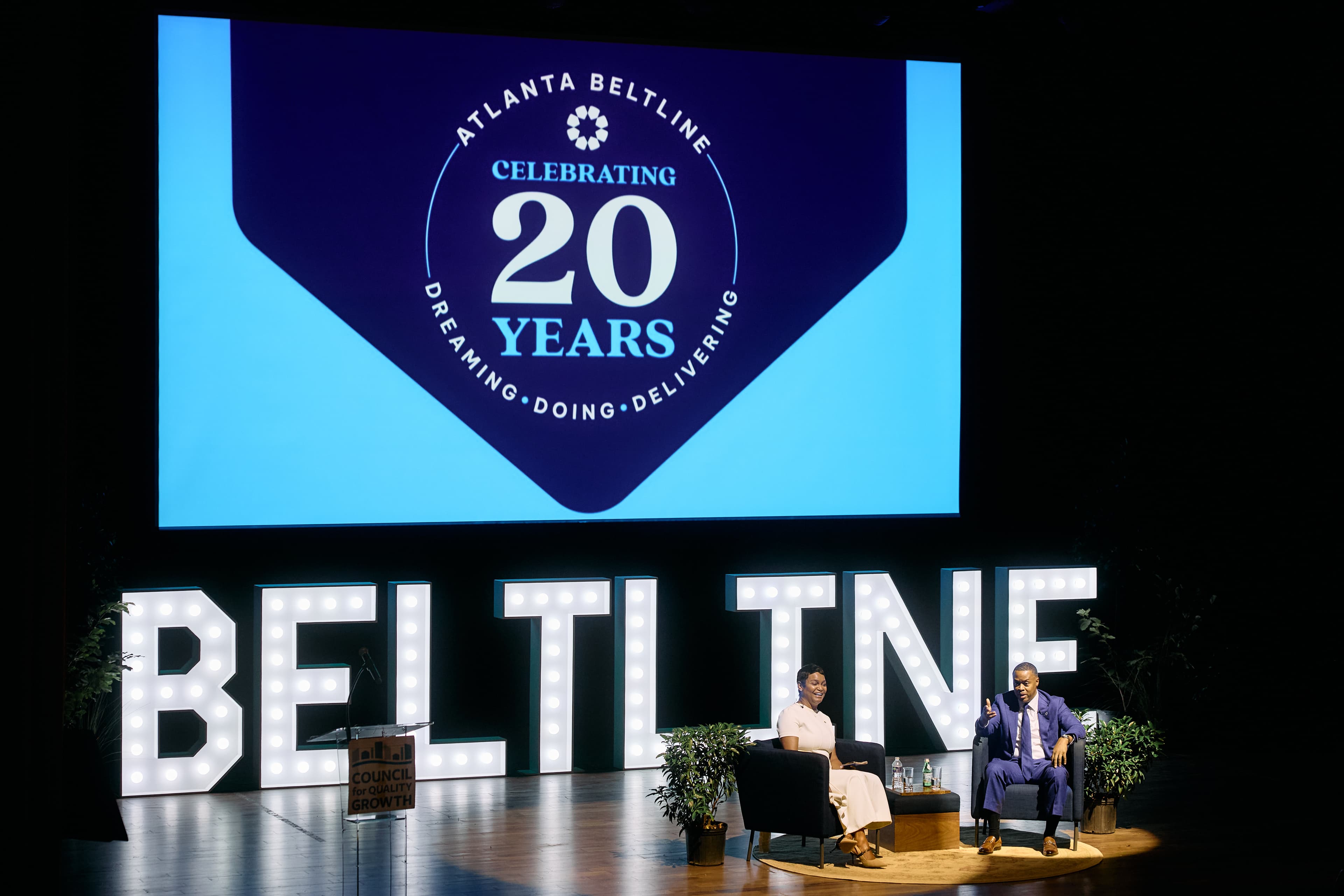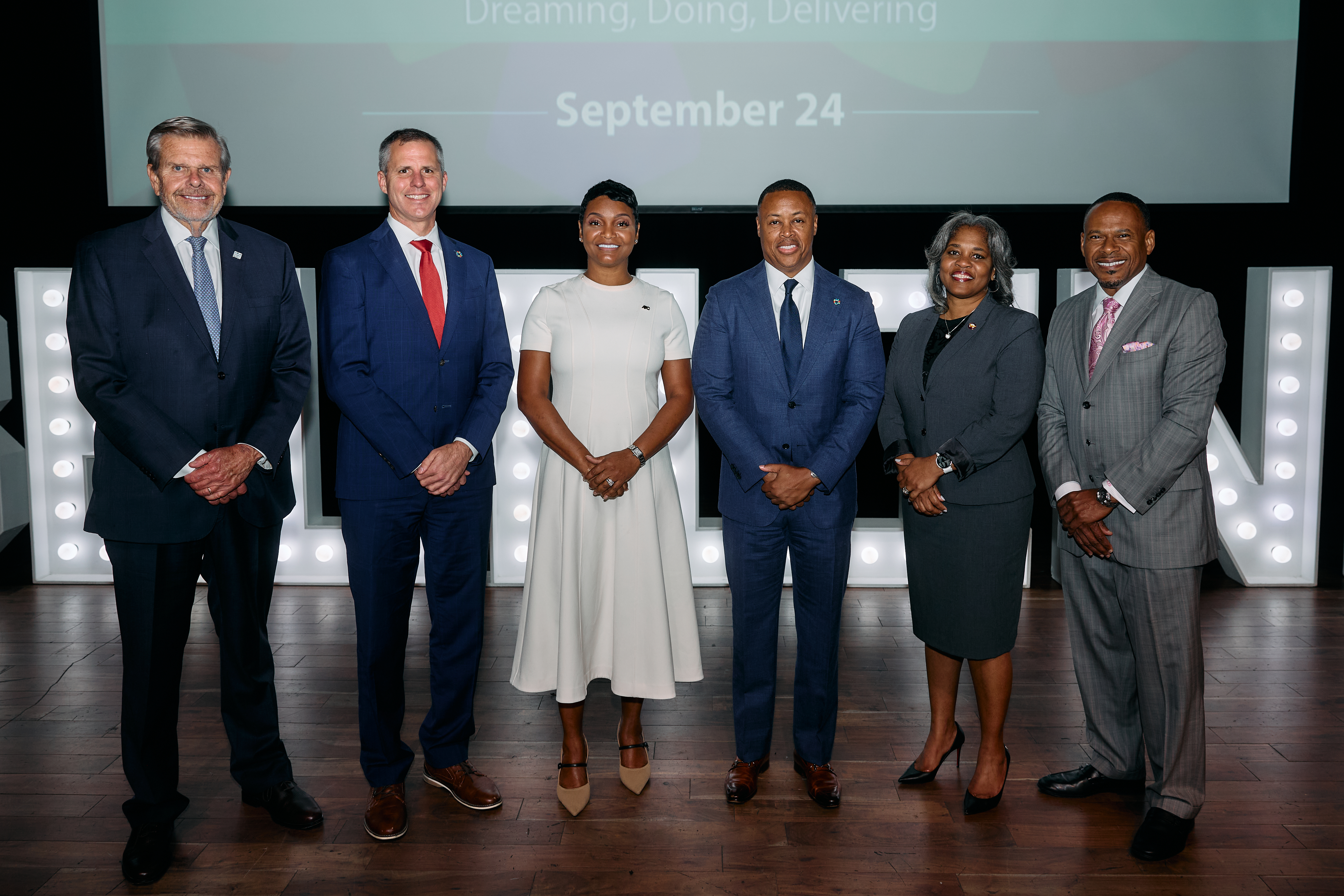Atlanta Beltline Celebrates 20 Years of Generational Impact at 2025 State of the Beltline
On September 24, the Council for Quality Growth and the Beltline co-hosted the State of the Beltline celebrating 20 years of generational impact.

On September 24, 2025, the Council for Quality Growth and the Atlanta Beltline co-hosted The 2025 State of the Beltline address and breakfast at The Eastern, a state-of-the-art theater adjacent to the Atlanta Beltline Eastside Trail. Over 350 Council for Quality Growth members of the development community, business leaders, elected officials, and other Beltline stakeholders gathered to hear this biennial update from the project’s leadership. The State of the Beltline concluded the Council’s annual series of “State of” events, following eight county addresses and State of MARTA all held earlier this year. “The Beltline continues to shape Atlanta’s future in meaningful ways,” said Michael Paris, President & CEO of the Council for Quality Growth. “We’re proud to provide a platform for its leadership team to share how this project creates economic value while building lasting connections between Atlanta’s communities.”
Anna Roach, Executive Director & CEO of the Atlanta Regional Commission, sat down with Clyde Higgs, President & CEO of Atlanta Beltline, Inc. and 2025 Chair of the Council for Quality Growth, for a fireside chat reflecting on 20 years of Beltline progress and what’s ahead.
Higgs credited the visionaries who launched the project in 2005, calling the Beltline “the most comprehensive community development project in the country—not just a one-trick pony.” He noted that the project has already delivered 76% of its affordable housing goal and is on track to exceed 7,000 units by 2030. He also highlighted City Council’s approval of the Special Service District during the pandemic, which secured $100 million in local funds and unlocked another $250 million. “Whoever writes the next book about the Atlanta Beltline has to remember the passage of the SSD,” Higgs said. “That’s how we can now say definitively we will finish the loop by 2030.”
On economic impact, Higgs shared that $800 million in public investment has catalyzed nearly $10 billion in private development and created more than 26,000 permanent jobs. He also announced a new $2 million commercial affordability program, the Local Developer Incentive Fund, to support small businesses and legacy entrepreneurs. “We’re getting the highest rents on the Beltline right now—not Buckhead, not Perimeter, but the Beltline,” he said. “We need to make sure we are preserving the culture, the legacy of Atlanta, and making sure that everyone is winning because of this investment.”
Looking ahead, Higgs shared more about the future of the Beltline and investing in long-term affordable housing, new parks and trails, and car-free mobility options beyond 2030. Higgs closed with a reminder that the Beltline remains “the people’s project.” He urged business and community leaders to stay engaged: “Don’t assume we’ve got it covered—we still need you. Challenge us, push us, and then when it’s time to make a decision, get behind it and go.”

City of Atlanta’s Chief Operating Officer, LaChandra Burks, opened the program with greetings from the city. She highlighted the collective effort of Atlanta’s community, government, and civic leaders in turning the Beltline from a bold idea into a transformative reality: “Twenty years ago, we were dreamers gathered around the table, determined to reconnect Atlanta—to create a city where every community could be linked by opportunity, culture, and hope,” Burks said. She reflected on her own experience as a founding board member of Atlanta Beltline, Inc., recalling early skepticism and challenges around safety and affordability, but also the pride of each milestone achieved. “With each challenge came another chance to deliver on our promise that every Atlantan will have a place on the Beltline and a stake in the city’s future,” she emphasized. Burks celebrated the Beltline’s 20 years of “Dreaming, Doing, and Delivering,” noting that the project is redefining what it means “to move, to gather, and to belong in Atlanta.”
Ruben Brooks, Chief Operating Officer of Atlanta Beltline, Inc., also shared project updates, emphasizing the Beltline’s acceleration and growing reach. The project now totals 12.8 miles of completed trail with six active construction projects underway. By June 2026, nearly 18 miles are expected to be open, including the Southside Trail, in time for the World Cup. “We are accelerating like never before, and we do not intend to stop,” said Brooks. “In the end, we’re building far more than infrastructure. We’re building equity, we’re building opportunity, and we’re building connection.” Brooks also highlighted progress on affordable housing and economic development. As of August 2025, the Beltline has created or preserved more than 4,200 homes within the Beltline Tax Allocation District and tripled its land holdings to over 90 acres.
Rob Brawner, Executive Director of Atlanta Beltline Partnership, emphasized the philanthropic investments that have powered these successes. To date, foundations, corporations, and individuals have invested more than $225 million in the Beltline, including historic commitments from the Robert W. Woodruff Foundation, the James M. Cox Foundation, and the Arthur M. Blank Family Foundation. “Our donors and our partners know that at its core, the Beltline is about people,” Brawner said. “It’s about addressing the displacement concerns of fixed-income seniors and low-income families, and through our Legacy Resident Retention Program, we’ve kept property taxes at 2019 levels for more than 270 homeowners—helping them build wealth as their home values appreciate,” he said.
As the Beltline approaches its 2030 completion, its impact continues to grow across Atlanta. Trails, parks, and public spaces are connecting communities, supporting local businesses, and creating opportunities for residents of all incomes. Investments in affordable housing, economic development, and commercial accessibility are ensuring that the benefits of the Beltline are shared widely, while planning for transit and mobility options is positioning the city for future growth. Through the collaboration of Atlanta Beltline, the City of Atlanta, and countless community partners, the Beltline remains a transformative project, shaping a more equitable, connected, and vibrant Atlanta for generations to come. The Council for Quality Growth is grateful for the partnership with the Atlanta Beltline and the work their entire team does each day to move our Atlanta region forward.
The full recording of 2025 State of the Beltline is now available for re-watch at www.councilforqualitygrowth.org/REWATCH.
Subscribe to In The Loop, our monthly newsletter, for Beltline news, events, announcements and more.